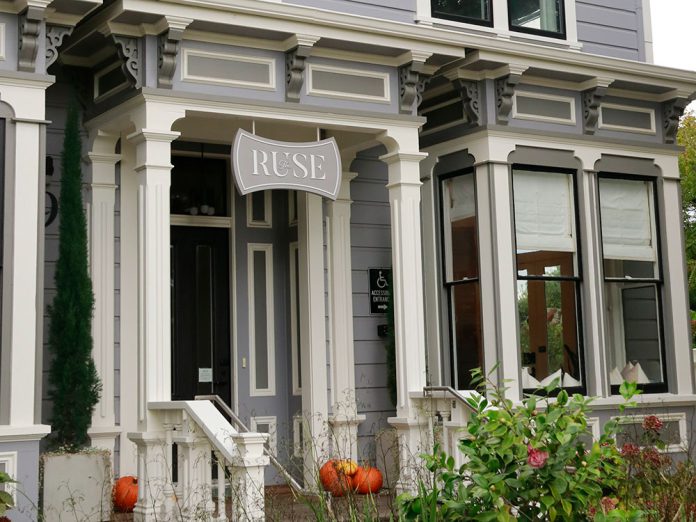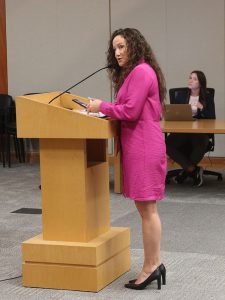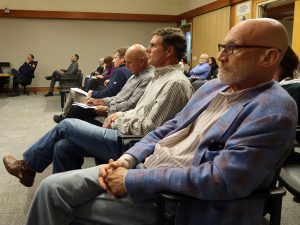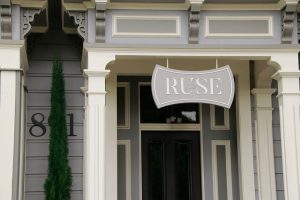
The City Council spent much of its Monday meeting listening to two groups from Grove Street talk about what being a “good neighbor” means. Does it mean, as one side implicitly held, following the rules, laws and conditions laid down by ordinance and code; or is it, as the other held, found in opening dialog, keeping promises and finding solutions?
The issue was a neighborhood challenge to the Planning Commission approval of a substance abuse treatment facility at The Ruse, a Grove Street B&B that has encountered significant community pushback since its expansion in 2022. But The Ruse has appeared on a number of “best” lists in the national travel press as a prime Wine Country bed-and-breakfast hotel.
Which is why it was something of a surprise when The Ruse executed a 180-degree pivot, and applied over the summer to become a substance abuse treatment facility, even while its application for a new liquor license was in the works. The Ruse Treatment would be a 13-room facility, with up to 30 employees and guests at a given time, who would be served three meals a day in a semi-private atmosphere, with appropriate and legal treatment for the guests.

It was a striking turn-about, and when the Planning Commission heard the application in September they cautiously approved it, though questions about that liquor license application hung in the air. Persistent neighborhood doubt and mistrust also lingered, and the Planning Commission ruling was appealed to the Healdsburg City Council, led by Ariel Kelley—herself both a council member and an immediate next-door neighbor to The Ruse. (The actual appeal document was signed by Patrice Veneziano, though Kelley was the most vocal petitioner at the meeting.)
When the appeal came up in the Nov. 3 agenda,, Kelley immediately recused herself from the dais but remained in the room as an active appellant, consistent with state law.
In a twist, the appeal wasn’t filed to overturn the approval of the treatment facility, but to add a number of conditions to that approval that would satisfy neighborhood objections on several fronts.
Still, as the appeal was legally filed within the 10-day open period, the council was obliged to hear it. Those who attended the Planning Commission meeting again heard from The Ruse’s new local treatment manager, Keith Greenberg, accompanied by co-owners Jonathan Wilhelm and his brother Patrick, as well as Executive Director Brian Stutz.
It was a time-consuming hearing, with first a city Planning Department overview, then time for both parties to present their case, plus rebuttals and summaries, as well as public comment and council debate. The entire hearing took about 80 minutes, and the council took a 10-minute break afterward before continuing with their business for the night (which included the Badger Park master plan and Foley Family Pavilion operational review).
The phrase “good neighbor” dominated the conversation like a motif in Mozart, with each side clearly on different sides of the definition. Team Ruse persistently argued their plans had been vetted by the state and national health organizations, and met local ordinances. Greenberg repeatedly said they were “willing to meet as many legally permissible conditions as we can,” but claimed that since he was a recent addition to The Ruse team in Healdsburg he couldn’t be held accountable for any promises made before he got here.

“I’m new to this situation,” he would say.
For the appellants, however, being a good neighbor meant something different: outreach, compromise and keeping promises. Kelley affirmed that while the initial B&B was being remodeled four and five years ago, she received a verbal promise that trees removed along her north fence, the resort’s south fence, would be replaced.
Absent any documentation—aside from the compelling images Kelley shared of her family’s back yard before and after the tree removal, showing the stark differences between the two views—the council found itself unable to apply that condition.
Another bone of contention was the driveway on the north side of the property, a chip-seal surface that apparently needs further treatment. Contractor Jerry Eddinger said as much at the Planning Commission meeting, but the Ruse team seemed to minimize the problem of dust being kicked up by large delivery and trash vehicles, suggesting it just needed to be hosed down. But whose responsibility is it to do so? Or to contract a new chip sealant? Barring a firm commitment or condition of approval, no such responsibility was assumed.
Another key issue was the visibility of the address at 891 Grove St. Kelly said people turn into her driveway all the time, and on at least one occasion entered her kitchen looking to check in. At the Ruse house, a narrow ornamental actually climbs the wall next to the front door and obscures the address—the 8 and the 1 are visible, but the 9 is completely obscured.

The fan on the kitchen roof proved to be the most insoluble problem. Every neighbor cited it as an irritant, but Greenberg and Jonathan Wilhelm said it met code, and was therefore not an issue. The fact that it ran too long—including in early-morning hours—was described as a budgetary problem. “Someone should turn it off,” Greenberg said.
Councilmember Ron Edwards asked detailed questions regarding the changes that the appellants requested, but the applicants were reluctant to deliver. “It might be cheaper in the long run just to do it, the little things you can do to keep us from being here,” said Edwards. But in the unusual circumstances of a council meeting reviewing a commission condition list, the council was hard pressed to find a compelling reason to vote yes.
So with no legal basis to require additional conditions, it came down to a question of what being a good neighbor means, a condition that could not be legally imposed.
Later, Kelley stated, “The Wilhelm brothers and Keith Greenberg have made a number of verbal commitments to myself and several of our neighbors that we hope they follow through on. While the hearing last night exposed that the City Council cannot legally mandate the Wilhelms to be good neighbors, these common sense solutions such as posting their address more prominently, paving their dusty driveway or moving the smoking lounge away from the neighbor’s porch, will be helpful in ensuring all of us can coexist with the rehab center next door.”
Jonathan Wilhelm declined to comment.








